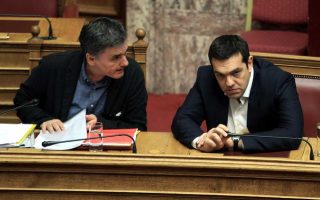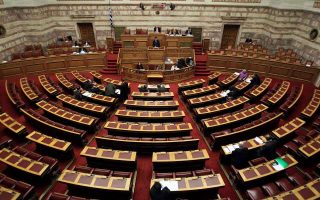Battle of the budget forecasts has been postponed until June

The Eurogroup has postponed the “battle of forecasts” on the Greek budget until after the European elections. On June 5, the report of the European Commission on the third post-bailout assessment will reflect its own estimate of the Greek primary surplus (and the recent voting of measures for 2019). However, the big battle will take place this fall.
The Greek side has already revealed its hand on the matter: It anticipates a primary surplus of 4.1 percent of gross domestic product this year as its baseline scenario, which does not include the measures voted, and a primary surplus marginally above the 3.5 percent target factoring in the handouts to pensioners and the value-added tax rate cuts.
The government has moved the goalposts for this year based mainly on the fact that last year’s primary surplus came to 4.29 percent, against an original forecast for 3.8 percent of GDP. It has therefore planned to hand out the entire projected fiscal leeway, plus an extra 200 million euros that it expects to collect from the settlement of debts to the tax authorities and the social security funds. The Greek side is also anticipating an increase in state revenues from the additional consumption its handouts could trigger.
After factoring in the handouts, the projections of the European Stability Mechanism take this year’s primary surplus to just 2.8 percent of GDP. However, even if the Europeans formally identify a fiscal gap in the 2019 budget, the government will not make any practical changes to its financial policy. It will only intervene in the Public Investments Program (again), which leaves little impression on citizens, in an effort to take the primary surplus to the desired level.
Yet the main battle of forecasts is scheduled for the fall, as the government will have to submit its first draft for the 2020 budget to the European Commission by September 15, which must include the cost of the handouts for 2019 and 2020, amounting to 1.5 billion euros, the cost of reversing the tax-free ceiling reduction, at some 2 billion, and the cost of the additional measures the government has announced for 2020, reaching up to another 800 million. That would require extra fiscal space of 4.3 billion euros in 2020.





